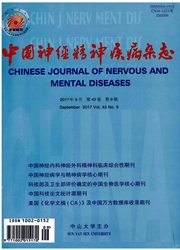

 中文摘要:
中文摘要:
目的探讨难治性抑郁症(Treatment.resistantdepression,TRD)外周血B细胞淋巴瘤白血病-2基因(B-celllymphomaLeukemia-2,Bcl-2)的表达及其在抗抑郁治疗后的变化。方法纳入TRD23例、非TRD26例与正常对照51名,抑郁症患者给予抗抑郁药物治疗8周,以汉密尔顿抑郁量表(HamiltonDepressionScale,HAMD)减分率评定疗效。用TaqMan探针及荧光实时定量法检测治疗前后抑郁症与正常人外周血白细胞Bcl-2基因表达水平。结果抑郁症组Bcl-2基因表达低于正常对照组[(1.845±1.234)vs(3.422±2.204)](P〈0.01);TRD组Bcl-2基因表达低于非TRD组及正常对照组[(1.361±0.731)vs(2.273±1.431)vs(3.422±2.204)](F=11.468,P〈0.01);TRD组和非TRD组患者经抗抑郁治疗后,HAMD量表平均减分率分别为62.23%和82.97%;TRD组经抗抑郁治疗后,Bcl-2基因表达(1.797±1.035)显著上升(P〈0.01),而非TRD组治疗后(2.623±1.785)基因表达上升无统计学差异(P〉0.05)。结论Bcl-2基因表达下降可能与抑郁症的病理生理机制有关.难治性抑郁症的Bcl-2表达水平下降更为明显.经抗抑郁治疗后Bcl-2表达水平上升。
 英文摘要:
英文摘要:
Objective To investigate the effects of antidepressants treatment on mRNA expression levels of B-cell lymphoma Leukemia-2 gene (Bcl-2) in peripheral blood mononuclear cells (PBMCs) from patients with treat- ment-resistant depression (TRD), and whether can affect the levels of Bcl-2 mRNA expression. Methods Twenty- three patients with TRD, 26 patients with treatment-effective depression (NTRD) and 51 healthy controls were enrolled in the present study. Patients received antidepressants for 8 weeks and HAMD was used to examine the effects of antidepressants. The mRNA expression levels of Bcl-2 in PBMCs from 49 patients with major depressive disorder (MDD) were estimated using relative TaqMan real time quantitative reverse transcription polymerase chain reaction (RT-PCR). Results The levels of Bcl-2 mRNA expression were significantly lower in PBMCs of MDD patients than those of healthy controls [(1.845 ± 1.234) vs. (3.422 ± 2.204)](P 〈 0.01); The mRNA expression levels of Bcl-2 were the lowest in patients with TRD among patents with treatment-effective depression and healthy control [ (1.361 ± 0.731) vs. (2.273 ± 1.431) vs. (3.422 ± 2.204)](F = 11.468, P 〈 0.01). After 8 week treatment, the average HAMD decrease rates of TRD were 62.23% in TRD patients and 82.97% in NTRD patients, respectively. The expres- sion levels of Bcl-2 mRNA were significantly increased in TRD patients (1.797 ± 1.035)(P 〈 0.05) but not in NTRD patients (2.623 ± 1.785) after antidepressant treatment. Conclusion This study demonstrates that the decrease in mRNA expression levels of Bcl-2 may be involved in the pathogenesis of major depressive disorder, espe- cially treatment-resistant depression. Acute antidepressant treatment can increase the mRNA expression of Bcl-2 only in NTRD patients.
 同期刊论文项目
同期刊论文项目
 同项目期刊论文
同项目期刊论文
 Association Study of Tryptophan Hydroxylase-2 Gene in Schizophrenia and Its Clinical Features in Chi
Association Study of Tryptophan Hydroxylase-2 Gene in Schizophrenia and Its Clinical Features in Chi Association Between BDNF Val66Met Polymorphism and Cognitive Performance in Antipsychotic-Naive Pati
Association Between BDNF Val66Met Polymorphism and Cognitive Performance in Antipsychotic-Naive Pati 期刊信息
期刊信息
